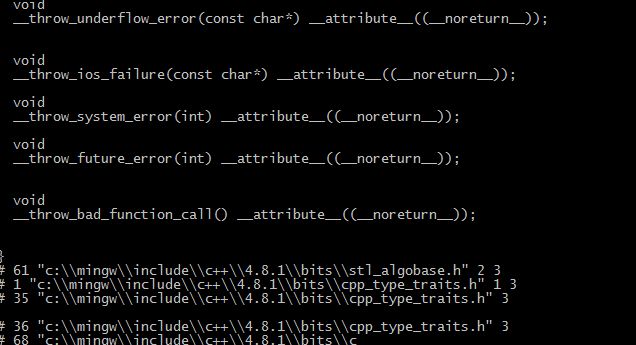无法编译简单的C ++程序
我正在学习C ++教程,在尝试编译第二个练习时,我得到了这个非常棒的结果:

它是一个永无止境的代码卷,没有其他任何事情发生。 我用于编译的代码是:
cpp Small.cpp
...文件的代码是:
#include <iostream>
int main(){
std::cout << "Hello!" << std::endl << 2+2;
return 0;
}
我不知道如何开始搜索此错误。
编译器是Windows的最新MinGW。
编辑:我可以恢复的内容:
{
template<typename _Tp>
static _Tp*
__copy_move_b(const _Tp* __first, const _Tp* __last, _Tp* __result)
{
const ptrdiff_t _Num = __last - __first;
if (_Num)
__builtin_memmove(__result - _Num, __first, sizeof(_Tp) * _Num);
return __result - _Num;
}
};
template<bool _IsMove, typename _BI1, typename _BI2>
inline _BI2
__copy_move_backward_a(_BI1 __first, _BI1 __last, _BI2 __result)
{
typedef typename iterator_traits<_BI1>::value_type _ValueType1;
typedef typename iterator_traits<_BI2>::value_type _ValueType2;
typedef typename iterator_traits<_BI1>::iterator_category _Category;
const bool __simple = (__is_trivial(_ValueType1)
&& __is_pointer<_BI1>::__value
&& __is_pointer<_BI2>::__value
&& __are_same<_ValueType1, _ValueType2>::__value);
return std::__copy_move_backward<_IsMove, __simple,
_Category>::__copy_move_b(__first,
__last,
__result);
}
template<bool _IsMove, typename _BI1, typename _BI2>
inline _BI2
__copy_move_backward_a2(_BI1 __first, _BI1 __last, _BI2 __result)
{
return _BI2(std::__copy_move_backward_a<_IsMove>
(std::__niter_base(__first), std::__niter_base(__last),
std::__niter_base(__result)));
}
# 617 "c:\\tdm-gcc-32\\lib\\gcc\\mingw32\\4.8.1\\include\\c++\\bits\\stl_algoba
e.h" 3
template<typename _BI1, typename _BI2>
inline _BI2
copy_backward(_BI1 __first, _BI1 __last, _BI2 __result)
{
;
return (std::__copy_move_backward_a2<__is_move_iterator<_BI1>::__value>
(std::__miter_base(__first), std::__miter_base(__last),
__result));
}
# 675 "c:\\tdm-gcc-32\\lib\\gcc\\mingw32\\4.8.1\\include\\c++\\bits\\stl_algoba
e.h" 3
template<typename _ForwardIterator, typename _Tp>
inline typename
__gnu_cxx::__enable_if<!__is_scalar<_Tp>::__value, void>::__type
__fill_a(_ForwardIterator __first, _ForwardIterator __last,
const _Tp& __value)
{
for (; __first != __last; ++__first)
*__first = __value;
}
template<typename _ForwardIterator, typename _Tp>
inline typename
__gnu_cxx::__enable_if<__is_scalar<_Tp>::__value, void>::__type
__fill_a(_ForwardIterator __first, _ForwardIterator __last,
const _Tp& __value)
{
const _Tp __tmp = __value;
for (; __first != __last; ++__first)
*__first = __tmp;
}
template<typename _Tp>
inline typename
__gnu_cxx::__enable_if<__is_byte<_Tp>::__value, void>::__type
__fill_a(_Tp* __first, _Tp* __last, const _Tp& __c)
{
const _Tp __tmp = __c;
__builtin_memset(__first, static_cast<unsigned char>(__tmp),
__last - __first);
}
# 719 "c:\\tdm-gcc-32\\lib\\gcc\\mingw32\\4.8.1\\include\\c++\\bits\\stl_algoba
e.h" 3
template<typename _ForwardIterator, typename _Tp>
inline void
fill(_ForwardIterator __first, _ForwardIterator __last, const _Tp& __value)
{
;
std::__fill_a(std::__niter_base(__first), std::__niter_base(__last),
__value);
}
template<typename _OutputIterator, typename _Size, typename _Tp>
inline typename
__gnu_cxx::__enable_if<!__is_scalar<_Tp>::__value, _OutputIterator>::__type
__fill_n_a(_OutputIterator __first, _Size __n, const _Tp& __value)
{
for (__decltype(__n + 0) __niter = __n;
__niter > 0; --__niter, ++__first)
*__first = __value;
return __first;
}
template<typename _OutputIterator, typename _Size, typename _Tp>
inline typename
__gnu_cxx::__enable_if<__is_scalar<_Tp>::__value, _OutputIterator>::__type
__fill_n_a(_OutputIterator __first, _Size __n, const _Tp& __value)
{
const _Tp __tmp = __value;
for (__decltype(__n + 0) __niter = __n;
__niter > 0; --__niter, ++__first)
*__first = __tmp;
return __first;
}
template<typename _Size, typename _Tp>
inline typename
__gnu_cxx::__enable_if<__is_byte<_Tp>::__value, _Tp*>::__type
__fill_n_a(_Tp* __first, _Size __n, const _Tp& __c)
{
std::__fill_a(__first, __first + __n, __c);
return __first + __n;
}
# 779 "c:\\tdm-gcc-32\\lib\\gcc\\mingw32\\4.8.1\\include\\c++\\bits\\stl_algoba
e.h" 3
template<typename _OI, typename _Size, typename _Tp>
inline _OI
fill_n(_OI __first, _Size __n, const _Tp& __value)
{
return _OI(std::__fill_n_a(std::__niter_base(__first), __n, __value));
}
template<bool _BoolType>
struct __equal
{
template<typename _II1, typename _II2>
static bool
equal(_II1 __first1, _II1 __last1, _II2 __first2)
{
for (; __first1 != __last1; ++__first1, ++__first2)
if (!(*__first1 == *__first2))
return false;
return true;
}
};
template<>
struct __equal<true>
{
template<typename _Tp>
static bool
equal(const _Tp* __first1, const _Tp* __last1, const _Tp* __first2)
{
return !__builtin_memcmp(__first1, __first2, sizeof(_Tp)
* (__last1 - __first1));
}
};
template<typename _II1, typename _II2>
inline bool
__equal_aux(_II1 __first1, _II1 __last1, _II2 __first2)
{
typedef typename iterator_traits<_II1>::value_type _ValueType1;
typedef typename iterator_traits<_II2>::value_type _ValueType2;
const bool __simple = ((__is_integer<_ValueType1>::__value
|| __is_pointer<_ValueType1>::__value)
&& __is_pointer<_II1>::__value
&& __is_pointer<_II2>::__value
&& __are_same<_ValueType1, _ValueType2>::__value);
return std::__equal<__simple>::equal(__first1, __last1, __first2);
}
template<typename, typename>
struct __lc_rai
{
template<typename _II1, typename _II2>
static _II1
__newlast1(_II1, _II1 __last1, _II2, _II2)
{ return __last1; }
template<typename _II>
static bool
__cnd2(_II __first, _II __last)
{ return __first != __last; }
};
template<>
struct __lc_rai<random_access_iterator_tag, random_access_iterator_tag>
{
template<typename _RAI1, typename _RAI2>
static _RAI1
__newlast1(_RAI1 __first1, _RAI1 __last1,
_RAI2 __first2, _RAI2 __last2)
{
const typename iterator_traits<_RAI1>::difference_type
__diff1 = __last1 - __first1;
const typename iterator_traits<_RAI2>::difference_type
__diff2 = __last2 - __first2;
return __diff2 < __diff1 ? __first1 + __diff2 : __last1;
}
template<typename _RAI>
static bool
__cnd2(_RAI, _RAI)
{ return true; }
};
template<bool _BoolType>
struct __lexicographical_compare
{
template<typename _II1, typename _II2>
static bool __lc(_II1, _II1, _II2, _II2);
};
template<bool _BoolType>
template<typename _II1, typename _II2>
bool
__lexicographical_compare<_BoolType>::
__lc(_II1 __first1, _II1 __last1, _II2 __first2, _II2 __last2)
{
typedef typename iterator_traits<_II1>::iterator_category _Category1;
typedef typename iterator_traits<_II2>::iterator_category _Category2;
typedef std::__lc_rai<_Category1, _Category2> __rai_type;
__last1 = __rai_type::__newlast1(__first1, __last1,
__first2, __last2);
for (; __first1 != __last1 && __rai_type::__cnd2(__first2, __last2);
++__first1, ++__first2)
{
if (*__first1 < *__first2)
return true;
if (*__first2 < *__first1)
return false;
}
return __first1 == __last1 && __first2 != __last2;
}
template<>
struct __lexicographical_compare<true>
{
template<typename _Tp, typename _Up>
static bool
__lc(const _Tp* __first1, const _Tp* __last1,
const _Up* __first2, const _Up* __last2)
{
const size_t __len1 = __last1 - __first1;
const size_t __len2 = __last2 - __first2;
const int __result = __builtin_memcmp(__first1, __first2,
std::min(__len1, __len2));
return __result != 0 ? __result < 0 : __len1 < __len2;
}
};
template<typename _II1, typename _II2>
inline bool
__lexicographical_compare_aux(_II1 __first1, _II1 __last1,
_II2 __first2, _II2 __last2)
{
typedef typename iterator_traits<_II1>::value_type _ValueType1;
typedef typename iterator_traits<_II2>::value_type _ValueType2;
const bool __simple =
(__is_byte<_ValueType1>::__value && __is_byte<_ValueType2>::__value
&& !__gnu_cxx::__numeric_traits<_ValueType1>::__is_signed
&& !__gnu_cxx::__numeric_traits<_ValueType2>::__is_signed
&& __is_pointer<_II1>::__value
&& __is_pointer<_II2>::__value);
return std::__lexicographical_compare<__simple>::__lc(__first1, __last1,
__first2, __last2);
}
# 941 "c:\\tdm-gcc-32\\lib\\gcc\\mingw32\\4.8.1\\include\\c++\\bits\\stl_algoba
e.h" 3
template<typename _ForwardIterator, typename _Tp>
_ForwardIterator
lower_bound(_ForwardIterator __first, _ForwardIterator __last,
const _Tp& __val)
{
typedef t
2 个答案:
答案 0 :(得分:1)
“cpp”代表C PreProcessor。您正在可视化程序的预处理版本,以及它包含的iostream头的源代码(和递归)。
答案 1 :(得分:0)
正如用户685684在评论中建议的那样,将“cpp small.cpp”替换为“c ++ small.cpp”可以解决问题并且不再发生奇怪的错误。
相关问题
最新问题
- 我写了这段代码,但我无法理解我的错误
- 我无法从一个代码实例的列表中删除 None 值,但我可以在另一个实例中。为什么它适用于一个细分市场而不适用于另一个细分市场?
- 是否有可能使 loadstring 不可能等于打印?卢阿
- java中的random.expovariate()
- Appscript 通过会议在 Google 日历中发送电子邮件和创建活动
- 为什么我的 Onclick 箭头功能在 React 中不起作用?
- 在此代码中是否有使用“this”的替代方法?
- 在 SQL Server 和 PostgreSQL 上查询,我如何从第一个表获得第二个表的可视化
- 每千个数字得到
- 更新了城市边界 KML 文件的来源?